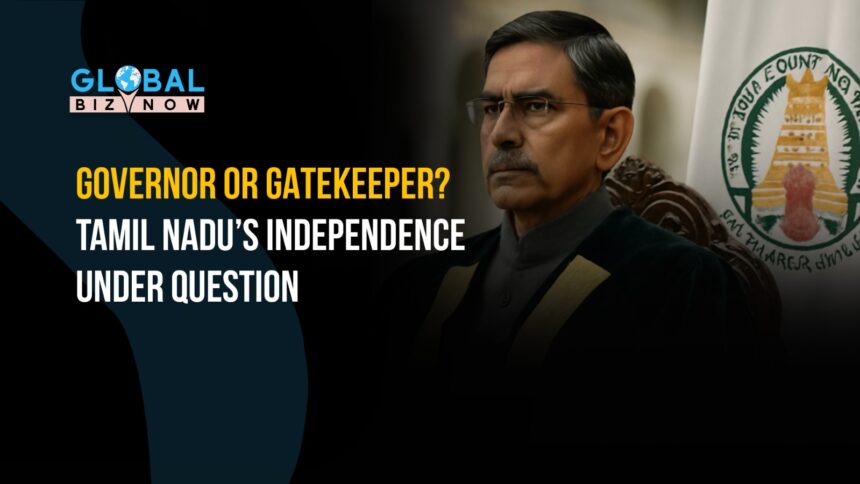On the eve of India’s Independence Day, as people across Tamil Nadu geared up to celebrate, there was a surprising turn of events. In the midst of hoisted flags, patriotic songs, and family gatherings, a speech from the Governor of Tamil Nadu caught everyone off guard. His words were stark, presenting a narrative of decay rather than celebration.
He spoke of a failing education system, rising suicide rates, persistent social issues, and an overall sense of insecurity in the state. His speech cast a dark shadow over Tamil Nadu, a state that had just been crowned India’s No. 1 economy in terms of gross state domestic product. Tamil Nadu’s industrial growth was booming, its welfare schemes were lauded, and investors were flocking to the state. Yet, the Governor’s words painted a picture that contradicted this narrative—one of decay rather than progress.
The Role of a Governor: A Bridge or a Blockade?
A Governor’s constitutional role is to serve as a neutral figure, a bridge between the Centre and the state, providing counsel to the elected government. They are meant to work in tandem with the Chief Minister and Council of Ministers, offering support and guidance, not obstruction. But when that neutrality turns into opposition, as seen in this case, the role becomes a blockade rather than a bridge.
Governor R.N. Ravi’s actions between 2021 and 2022 revealed a troubling trend. He sat on 19 bills passed by the Tamil Nadu Assembly without approval or rejection, withholding them indefinitely. Notable bills such as the Anti-NEET Bill, welfare legislation, and university appointment bills were all held up under his watch. Instead of debating policies, democracy was being delayed.
Supreme Court’s Intervention: A Call for Action
After months of political stalemate, the matter was taken to the Supreme Court. The judges were unequivocal in their ruling, stating that the Governor’s actions were illegal and arbitrary. They imposed deadlines on the Governor to approve or reject bills within a month and to act swiftly when the Assembly re-passed bills. The Court made it clear that the Governor’s role was not to be a hindrance but a facilitator of democracy.
Raj Bhavan: A Symbol of Privilege or Power?
Behind this political drama is Raj Bhavan, the Governor’s residence, which sits on 156 acres of prime land in Chennai. It’s not just a government office but a sprawling estate that is maintained at the taxpayer’s expense. With over 125 employees, state-of-the-art security, and elite protocols, Raj Bhavan is a symbol of political privilege. But what is the true purpose of such an institution? Is it to serve the people or to hold speeches that undermine the state it represents?
The Cost of Contempt: A Governor’s Remarks
In a state where crime data shows a decline in criminal activity, where the economy is thriving, and where public education reforms are gaining international recognition, the Governor’s remarks are not just inaccurate—they are damaging. His words, describing Tamil Nadu as a failing state, risk undermining public morale and investor confidence. What is the intention behind such rhetoric?
A Pattern, Not a Party Agenda
While Governor Ravi’s actions may seem particularly divisive, the reality is that this situation is not new. Tamil Nadu has a history of Governors acting as agents of Delhi, rather than as protectors of democracy. In 1976, during the Congress-led government, the DMK’s government was dismissed by the Centre. This pattern of political maneuvering is not about a particular party—it’s about an undemocratic trend of Governors overstepping their constitutional bounds.
The Case for Reform: Rethinking the Role of Governors
Given the current state of affairs, it’s time to question the role of the Governor altogether. Shouldn’t Governors be appointed in consultation with the Chief Minister? Shouldn’t there be clear limits to their powers and accountability to the people? As political analyst Anna Durai once quipped, “A Governor is like a goat’s beard. It adds no value.” Perhaps it’s time for Tamil Nadu to reconsider the necessity of such an office altogether.
The Bigger Question: What Does Tamil Nadu Really Need?
As Tamil Nadu continues to rise economically, politically, and socially, the real question we must ask ourselves is: what does the state truly need? Do we need a Raj Bhavan, a symbol of privilege and political obstruction? Or do we need a government that listens to its people, one that is responsive and accountable to the public?
What do we fund with our taxes—a sprawling estate for a Governor, or a future that benefits the people of Tamil Nadu? Should democracy be in the hands of an unelected figure who criticizes from the comfort of a grand residence, or should it be in the hands of the elected government that answers directly to the people?
If the Governor cannot represent the pride, progress, and prosperity of Tamil Nadu, then perhaps the question isn’t just whether we need a Governor. Maybe the real question is: Do we need someone who doesn’t need us? GBN


















